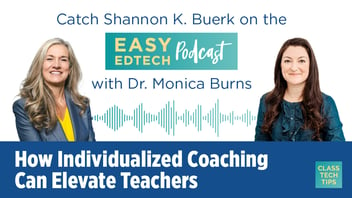All Teachers Need This Support Team Right Now | engage2learn
As we began to collaborate with our district partners and what coaching would look like as school buildings remained closed, one thing was clear: they all still wanted a way to support their educators. For so long, educators have agonized over how to support students and ensure that every child’s social and emotional well-being was being met, and all of that is still valid and maybe even more concerning at a distance. It was lonely enough not being able to hug their students and see them in person, but it was also professionally isolating when many educators rely on collaborative relationships that occur more naturally in daily interactions on campuses.
Under normal circumstances, the importance of those collaborative professional relationships is key to helping our teachers, but in the face of a complete upheaval of the entire education system, collaborative support for teachers is non-negotiable.
This past Spring, as we pivoted to providing virtual coaching support for all of our partners, we were intentional in helping our partner districts set up campus-based, virtual support teams to give each teacher access to their own team of collaborative, problem-solvers. One of our partners, Arlington ISD, wanted to ensure that they had virtual professional learning teams in place for two main reasons:
- Identify the needs of teachers as they transition to remote teaching and learning
- Design a campus-specific, collaborative system of support for teachers
What is a Campus Support Team?
You might be thinking, what’s the difference between these virtual professional learning teams, we call Campus Support Teams, and traditional Professional Learning Communities? Professional Learning Communities (PLC) occur when teachers interact and collaborate using a reflective cycle to improve student outcomes while learning from each other. The beauty of PLCs is that teachers are the ones reflecting their own practice, innovating, and making adjustments that ultimately impact students.
Campus Support Teams (CST), on the other hand, are solely focused on the opportunities to support classroom teachers. Each Campus Support Team is centered around identifying collective areas of support and resources to create high quality, engaging distance learning. Campus Support Teams in Arlington ISD utilized e2L’s Best Practices for Blended Learning and they immersed themselves in locating/designing resources, sharing professional learning opportunities offered through e2L’s online courses, and provided implementation support as teachers began to teach remotely. Campus Support Teams are made up of a combination of campus (and sometimes district) staff members who are not the classroom teachers but have the unique opportunity to be in a support role. Members of CSTs could include but are not limited to: Counselors, Librarians, Instructional Technology, Interventionists, Instructional Coaches, Administrators, and Academic Deans.
Arlington ISD formed Campus Support Teams at all 75 of their campuses that included the campus Librarian, Instruction coach or Interventionist, Dean and/or Associate Principal and depending on the campus, Active Learning Cycle Coach, Instructional Facilitator, Professional Learning and Campus Technology staff members. Two other partner districts, Spring ISD and El Paso ISD, also implemented Campus Support Teams this Spring. El Paso ISD had a district-wide CST rollout, while Spring ISD is planning a district-wide rollout this fall.
The Campus Support Teams in Arlington were led by an e2L Certified eGrowe Coach that utilized the eGROWE Learning Process. This structured learning process helps ensure the Campus Support Teams are guided and focused on providing strategic support processes specifically tailored to their teachers’ needs. With the eGROWE Learning Process, the Campus Support Team considers:
- Goal: What are the goals of the team?
- Reality: What is our current campus reality?
- Options: What options do we have to support our teachers?
- Will: What will we commit to doing to support teachers?
- Evidence: What evidence can we look at next time?
“The [Campus Support Teams] helped us flush out next steps for virtual learning and put a timeline to tasks needing to be completed. e2L coaches shared some valuable resources for our teachers and leadership team as we plan for the conclusion of our year and next fall.” Arlington Dean
The response to the Campus Support Teams was so positive that Arlington is continuing these collaborative teams for the 20-21 school year. They leveraged positions already on campus with established relationships and knowledge of the campus context to turn their efforts into impact through the support of their teachers.
Do you want to implement Campus Support Teams in your district, but the idea seems a little daunting? Consider these 4 steps to help you get started:
- Complete the Campus Support Team Planning Template, which helps to take the guesswork out of essential components needed to establish a successful Campus Support Team, so your systems are set up right, the first time.
- Identify a Campus Support Team project lead on each campus. This is a time for shared ownership, not buy-in. The project lead helps to spearhead the work and keep the team on track. Lucy Elizondo shares more about project management in her blog: 9 Essential Tips for Virtual Project Management.
- Establish predictable, consistent, productive communication. During a time when everything is unpredictable, it is important to stay connected, ask for input and feedback, and do so on a consistent basis. We don’t have time for long, drawn-out meetings that end in another meeting being set. For additional ideas, check out Shannon Buerk’s blog: Tips for Virtual Meetings That Work.
- Humanize the work. As we ask teachers to transition seamlessly between face-to-face learning and remote learning this fall, campus support teams are a way to support teachers through their vulnerabilities in navigating these uncharted waters. We are all doing something we have never done before, so it is important to lead with the heart, practice empathy, and listen.
Teachers are returning to school remotely or in-person learning, and I think we can agree they are worried about how the current reality is impacting students and honestly, themselves. What is the one thing you can do in your circle of influence that acknowledges their concerns are valid and lifts them up in a way that can alleviate some of the stress? The creation of Campus Support Teams is that one thing! They find ways to support and care for teachers who are supporting and caring for the students. Simon Sinek says, “The ability for a group of people to do remarkable things hinges on how well those people can pull together as a team.” How will you leverage your teams to do remarkable things for teachers and kids?



